Story of Government College University
(GC University) Lahore
The Open Air Theatre still feels fresh in my Mind
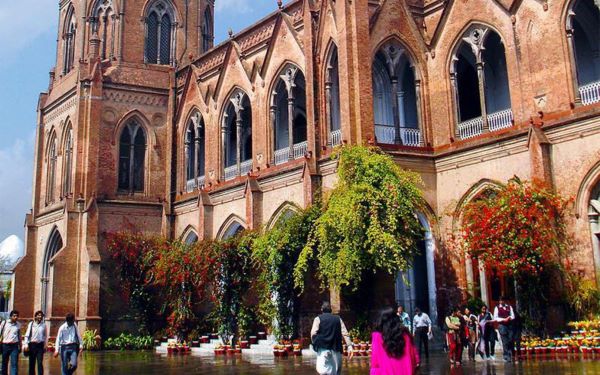 Government College University Lahore - Front Shot
Government College University Lahore - Front ShotGovernment College University Lahore is one of the most prized and historic educational institutions with a rich history and heritage. And sure, it was my alma mater too. I am an Old Ravian.
Let me walk down memory lane, stay there for a while, and share a little bit about my alma mater.
Government College University, Lahore, is an institution that feels as much like living in the old times as it feels like being in a modern university.
If you’ve ever walked down the famous Mall Road in Lahore and glimpsed that handsome red-brick structure, you may know what I mean.
Government College University (GCU) has been shaping minds, tastes, and careers for well over 150 years.
In this casual, no-jargon tour, let me trace how it started, what makes its architecture so distinctive, who passed through its corridors, what you can study now, how the fee structure typically works, what student life looks like, and where it stands in the rankings.
Along the way, you’ll see why Ravians carry a special kind of pride.
A quick origin story: how Government College University began
If you rewind to 1864, Government College (as it was then known) opened its doors on 1 January in a modest rented building inside Lahore’s walled city.
The British colonial administration founded it as a premier institution for liberal arts and sciences in the Punjab.
The first principal was Dr. Gottlieb Wilhelm Leitner, a multi-lingual scholar with serious academic ambition. Dr. Gottlieb set a tone that still echoes at GCU: scholarship with standards, and a love for ideas.
In those early days, Government College was affiliated with the University of Calcutta. (At that time, the University of the Punjab didn’t exist yet).
When the University of the Punjab was established in 1882, Government College became one of its standout affiliated colleges.
Soon enough, the College grew out of its first quarters and moved to its current site off The Mall (Katchery Road). The cornerstone for the main building was laid a few years after the college’s founding, and the core structure came into use by the 1870s (consequently by 1877).
The building was a project of the Punjab Public Works Department.
It was a state-backed effort guided by colonial-era architects and engineers rather than a single “star” architect.
From those small beginnings, Government College University developed a powerful academic culture.
It grew beyond the classics to embrace modern sciences—physics, chemistry, mathematics, while also building the student-life traditions that would become its signature: debating, dramatics, sports, and that beloved literary magazine, The Ravi.
Architecture you can’t miss: Government College University’s red-brick charm
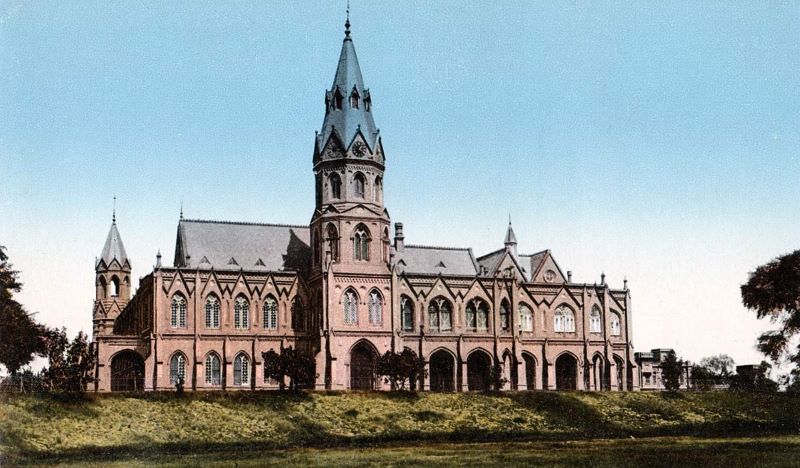 Government College University Lahore - Architectural Marvel
Government College University Lahore - Architectural MarvelWalk past Government College University and you’ll instantly get why people call it one of Lahore’s crown jewels.
The main block is a Gothic-Revival beauty in red brick, with pointed arches, lofty ceilings, arched verandas, and a tower that punctuates the skyline.
It’s Victorian in inspiration, but cleverly adapted to the climate and culture of Punjab.
A few features you’ll hear people rave about
- The Oval: That vast green ground in front of the main building. It served as equal parts ceremonial ground and social hub. It also hosted generations of sports days, convocations, and casual hangouts.
- Quadrangles and corridors: Elegant passages and interior courtyards give the campus a calm, reflective feel. It’s the kind of place where you can imagine a poet finding a line or a physicist sketching an equation.
- Bukhari Auditorium and the library: Over the years, Government College University added landmark spaces like the Bukhari Auditorium (named for the legendary principal and writer Patras Bokhari) and an atmospheric library hall, along with newer science blocks and department buildings.
Because the main building is a heritage site, GCU has worked to preserve its exterior brickwork and timber details, while modernizing interiors to suit labs, classrooms, and offices.
Expansion has been steady, especially after the institution became a full-fledged university in 2002.
New departments, research centers, and dedicated blocks have all helped GCU grow into a comprehensive, research-driven university—while staying true to its architectural soul.
From college to university: Government College University’s big leap in 2002
On 12 October 2002, Government College crossed a historic threshold and became Government College University, Lahore.
That change wasn’t just cosmetic. With university status came a vice chancellor-led governance structure, the authority to award degrees under its own charter, and a strategic push into postgraduate programs and research.
A few shifts and additions that stand out
- Abdus Salam School of Mathematical Sciences (ASSMS): Named for Nobel Laureate and Ravian Dr. Abdus Salam, ASSMS became a national leader in advanced mathematics—pulling in international faculty, hosting serious research seminars, and graduating a notable number of MPhil and PhD scholars.
- Science and interdisciplinary growth: GCU invested in advanced laboratories and expanded into areas like environmental sciences, biotechnology, and data-driven fields. The sciences at GCU—especially physics and mathematics—have long punched above their weight.
- Social sciences and management: Economics, psychology, political science, history, and management programs have all grown in scope and sophistication, aligning curricula with 21st-century needs.
- Quality assurance and accreditation: Post-2002, GCU has worked closely with the Higher Education Commission (HEC) on program approvals, faculty development, and research funding, and with professional bodies where relevant.
What didn’t change?
The heart of GCU’s academic culture remains.
Group learning in the humanities, rigorous foundations in the sciences, a love of public speaking and performance, and the confidence to question and create.
GC Alumni
Ravians are definitely everywhere in the world now.
Government College University alumni are everywhere: universities, courts, labs, newsrooms, embassies, TV studios, and of course, on bookshelves.
Here are a few of the notable names:
- Allama Muhammad Iqbal: Poet-philosopher and national thinker. He studied and later taught at Government College, and his influence still looms large on campus.
- Dr. Abdus Salam: Nobel Laureate in Physics (1979), undergraduate at Government College and later professor, one of Pakistan’s most celebrated scientists.
- Faiz Ahmed Faiz: Iconic Urdu poet and public intellectual; also taught at Government College.
- Patras Bokhari (Syed Ahmad Shah): Writer, humorist, diplomat, and a principal of Government College in the 1940s; the Bukhari Auditorium bears his name.
- Ashfaq Ahmed: Beloved short-story writer and broadcaster.
- Bano Qudsia: Distinguished novelist and playwright.
- Dr. Samar Mubarakmand: Nuclear scientist and influential figure in science and technology.
- Chaudhry Muhammad Ali: Former Prime Minister of Pakistan.
- Mustansar Hussain Tarar: Writer, traveler, television personality.
- K. K. Aziz: Historian and scholar.
This list barely scratches the surface.
GCU’s alumni network is vibrant and engaged, with seasoned Ravians often mentoring and supporting newer ones.
What was taught then vs. now at Government College University
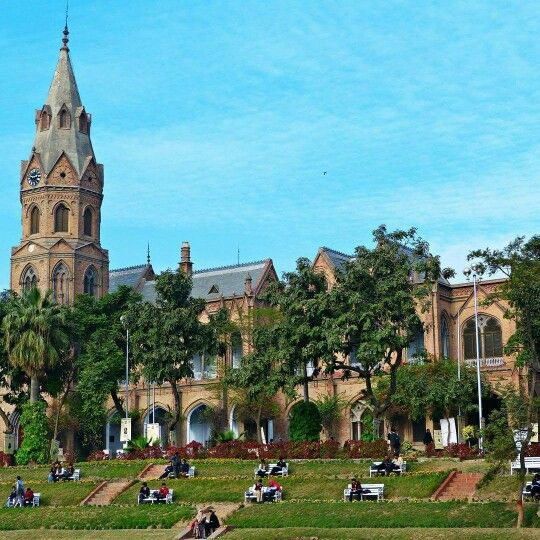
Like most great institutions, GCU’s academics evolved over the period of time.
Here’s a quick before-and-after snapshot.
Earlier decades
- The early framework centered on FA and BA programs, with a strong classical liberal-arts core and, increasingly, the modern sciences.
- As laboratories and faculty expertise grew, GCU offered BSc tracks and later MA/MSc degrees in subjects like English, Philosophy, History, Persian, Arabic, Physics, Chemistry, and Mathematics.
- “Honours” tracks added extra rigor and research exposure, particularly in the sciences.
Today’s offerings
Government College University now teaches from the intermediate level all the way up to PhD—across a wide range of disciplines.
The exact list can vary by year, so always check the latest prospectus, but the broad landscape looks like this:
- Intermediate (Higher Secondary)
- FA
- FSc (Pre-Medical, Pre-Engineering)
- ICS
- ICom (depending on the session)
- BS (4-year) programs
- Natural and Physical Sciences: Physics, Chemistry, Mathematics, Statistics, Computer Science, Zoology, Botany, Biotechnology, Environmental Science.
- Social Sciences: Economics, Political Science, Psychology, Sociology.
- Humanities and Languages: English, Urdu, Persian, Punjabi, History, Philosophy, Islamic Studies.
- Management and Commerce: BBA, BS Accounting & Finance (titles and availability may change).
- Media and Arts: Mass Communication/Media and Communication Studies, Fine Arts/Design (as offered).
- Applied/Engineering-oriented areas: Offered in certain years via specific departments; accreditation and availability should be confirmed in the current prospectus.
- Graduate programs
- MPhil and MS in a wide range of fields across sciences, social sciences, and the humanities.
- In some departments, MA/MSc still run, though many areas have transitioned to the BS–MPhil–PhD ladder.
- Doctoral (PhD) programs
- Notably strong in mathematics (ASSMS), physics, chemistry, and biosciences, with offerings in selected social sciences and humanities aligned to faculty and research capacity.
The Takeaway
GCU balances its historic strengths (especially math and physics) with a broad spectrum of contemporary disciplines, letting students mix foundational rigor with modern relevance.
Fees at Government College University: how it typically works
Let’s talk money in plain language. Public universities in Punjab usually have two fee bands:
Regular/morning (lower) and self-support/evening (higher).
Government College University follows that pattern, with separate schedules for intermediate, BS, MPhil/MS, and PhD programs, plus one-time charges and hostel/mess where applicable.
Important Note
Fees get updated. If you need precise numbers for a specific program and session, the official GCU fee schedule and prospectus are the final word. Please contact GC University directly for the updated Fees Plan.
That said, here’s an overview to set expectations based on recent public-sector norms:
- BS (Regular/Morning): Traditionally the most affordable option, with per-semester totals often in the tens of thousands of Pakistani rupees (as an indicative idea, roughly PKR 30,000–60,000 per semester in recent cycles, excluding hostel and one-off charges). This is not a quote—just a typical public-sector range.
- BS (Self-Support/Evening): Usually higher than morning—sometimes about double or more, depending on the discipline.
- MPhil/MS: Per-semester tuition tends to be higher than undergraduate regular, but still well below private university levels for comparable programs.
- PhD: Often priced lower than MPhil on a per-credit basis, though research and thesis evaluation fees apply.
- One-time and annual charges: Things like admission/enrollment, examination, library/lab, student societies, medical fund, and a refundable security deposit.
- Hostel and mess: Hostel rent and utilities are separate; mess charges are typically paid monthly through mess committees.
Don’t forget: scholarships and need-based aid can make a big difference. GCU and external bodies often offer merit- and need-based support, so it’s worth doing your homework—and applying on time.
Life beyond classes: extracurriculars at Government College University
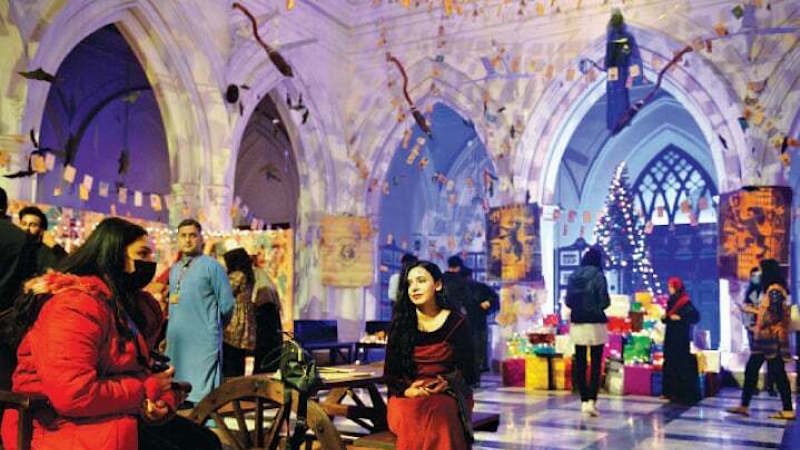 Harry Potter Show at Government College University (GC University)
Harry Potter Show at Government College University (GC University)If there’s one thing Ravians brag about (with good reason), it’s the co-curricular scene.
Government College University has an almost legendary status in debate, theater, and sports, and a rich mix of societies that turn students into articulate, well-rounded leaders.
What you’ll find on campus
- Debating: The Government College Debating Society (both Urdu and English) is a powerhouse. Expect parliamentary debates, declamation contests, and intercollegiate championships.
- Dramatics: The Dramatics Club stages classics and contemporary plays, sharpening acting, direction, and stagecraft. Many well-known stage and screen personalities got their start here.
- Literary and music culture: Urdu and English literary societies, music clubs, readings, mushairas—GCU’s cultural programming honors its poetic heritage and keeps things vibrant.
- The Ravi magazine: One of South Asia’s oldest student publications—an enduring platform for essays, poems, art, and campus commentary.
- Science and subject societies: Physics, Chemistry, Mathematics, Computer Science, Biology, and others host seminars, colloquia, hackathons, and competitions.
- Entrepreneurship and business clubs: Pitch days, case competitions, and guest talks that connect students with industry.
- Sports: Cricket and hockey, of course, plus athletics, badminton, squash, football, table tennis, and more.
The Oval is where sports and spirit meet.
- Adventure and environment: Trekking/hiking groups and environmental societies organize trips, clean-ups, and awareness drives.
- Community service: Blood-donor societies and volunteer clubs create channels for giving back.
- Student representation: Within policy limits, student bodies and reps help organize events and act as a bridge with the administration.
Being in GC University, you’ll learn as much outside class as you do inside it, and certainly, you’ll have a great time doing it.
How Government College University ranks (locally and globally)
Rankings can be a bit of a moving target. Different agencies use different methods, and lists change every year. Here’s the straight talk:
- Nationally: Pakistan’s HEC has not always published a comprehensive, updated ranking list in recent years. By reputation, alumni outcomes, and faculty strength, Government College University is widely considered among the leading general public universities in Punjab. There isn’t a single, official, fixed national rank to cite right now.
- Internationally: Government College University has appeared in regional and thematic rankings (for example, QS Asia and Times Higher Education’s Impact Rankings) in some cycles. The exact band or position can vary year-to-year, and not every program is ranked in every cycle.
If you’re comparing options, the best approach is to check the latest QS and THE websites for current positions.
The rankings change, and the agencies’ sites are the authoritative sources to check.
Culture and traditions that stick with you
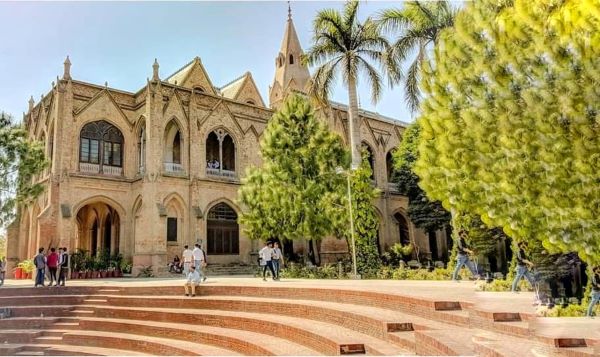 GC University Open Air Amphitheater
GC University Open Air AmphitheaterPart of GCU’s magic is its sense of identity.
Students and alumni call themselves “Ravians,” a nod to the Ravi River and to The Ravi magazine.
The motto many associate with Government College University—“Courage to Know”—captures the spirit of inquiry and independence you feel on campus.
A few rituals and rhythms to love:
- Convocation on the Oval: That classic red-brick backdrop and a sea of gowns—it’s a rite of passage you won’t forget.
- Iqbalian Heritage: Lectures, performances, and commemorations celebrate Allama Iqbal and the broader impact of the humanities on civic life.
- Research Buzz: Colloquia in math and physics, social science seminars, guest lectures—there’s always something on the academic calendar.
Quick admissions pointers for Government College University
If GCU is on your shortlist, here’s how to stay ahead of the curve:
- Watch the official website: Admission notices, eligibility criteria, tests (if any), and merit lists are posted there. Departments also update pages with faculty profiles and course outlines.
- Check accreditation: For fields that lead to professional practice, confirm program accreditation with the relevant body.
- Budget smartly: Factor in one-time fees, lab or studio surcharges (where applicable), hostel/mess costs, and the difference between morning and self-support tracks.
- Apply for aid: Scholarships can make a substantial difference—merit-based and need-based options exist both within GCU and externally.
- Clarify program details: Titles, seat counts, and even program availability can change by session, so rely on the latest prospectus for specifics.
Why Government College University still matters
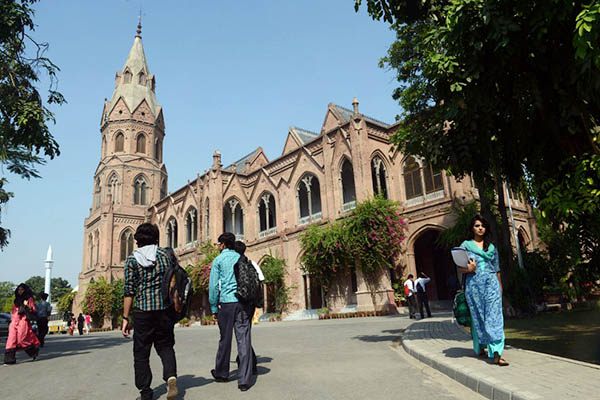 Life at GC University Lahore
Life at GC University LahoreStrip away the nostalgia and the red brick, and you’ll still find GCU’s core value:
It teaches you how to think, write, speak, and lead.
The place has a rare mix—you can take a rigorous physics course in the morning, attend a poetic mushaira in the afternoon, and then win a debate in the evening.
That blend of liberal-arts depth and scientific discipline has produced a steady stream of teachers, researchers, civil servants, reformers, entrepreneurs, and artists.
As the higher-education landscape modernizes, Government College University has kept pace—expanding research, refreshing curricula, and upgrading labs—while preserving its heritage architecture and intellectual ethos. It’s a living example of how tradition and innovation can reinforce each other.
Last But Not Least Word on My Alma Mater - Government College University
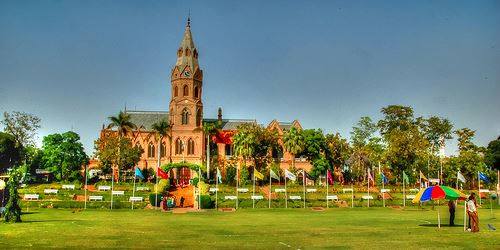
Government College University’s story makes one thing clear: when history, architecture, scholarship, and student life come together this well, you don’t just go to a university—you join a tradition.
GC University, with 150+ years of history and its strong network of Alumni, places itself where it is not easy for others to come near it.
Though it may be a little personal take, so be it.
Talking about GC Lahore has transported me back to those days when I used to sit in the open-air amphitheater in winter.
The sweet smell of the roses from all around, and the feel of the comforting breeze, made me sit for a long time at that place.
There was a vibrance of the ambiance all around the place, and its strange pull had every element in it, the literary, creative, and scholarly.
Although I can't go back in time, sure, the memory of it lives forever, and as fresh as it can be.
For more on Government College Lahore you may also read on Wiki

Zeerik ahmad - Founder, Author & Publisher
Certified Six Sigma Black Belt & Marketing Communications Coach
IdeasBeat is an emerging eMagazine and a Multimedia Publishing House where we hunt for diverse ideas and stories from around the world with a key focus on personal and professional growth.
You can contact us here
You can Read More History Stories at IdeasBeat